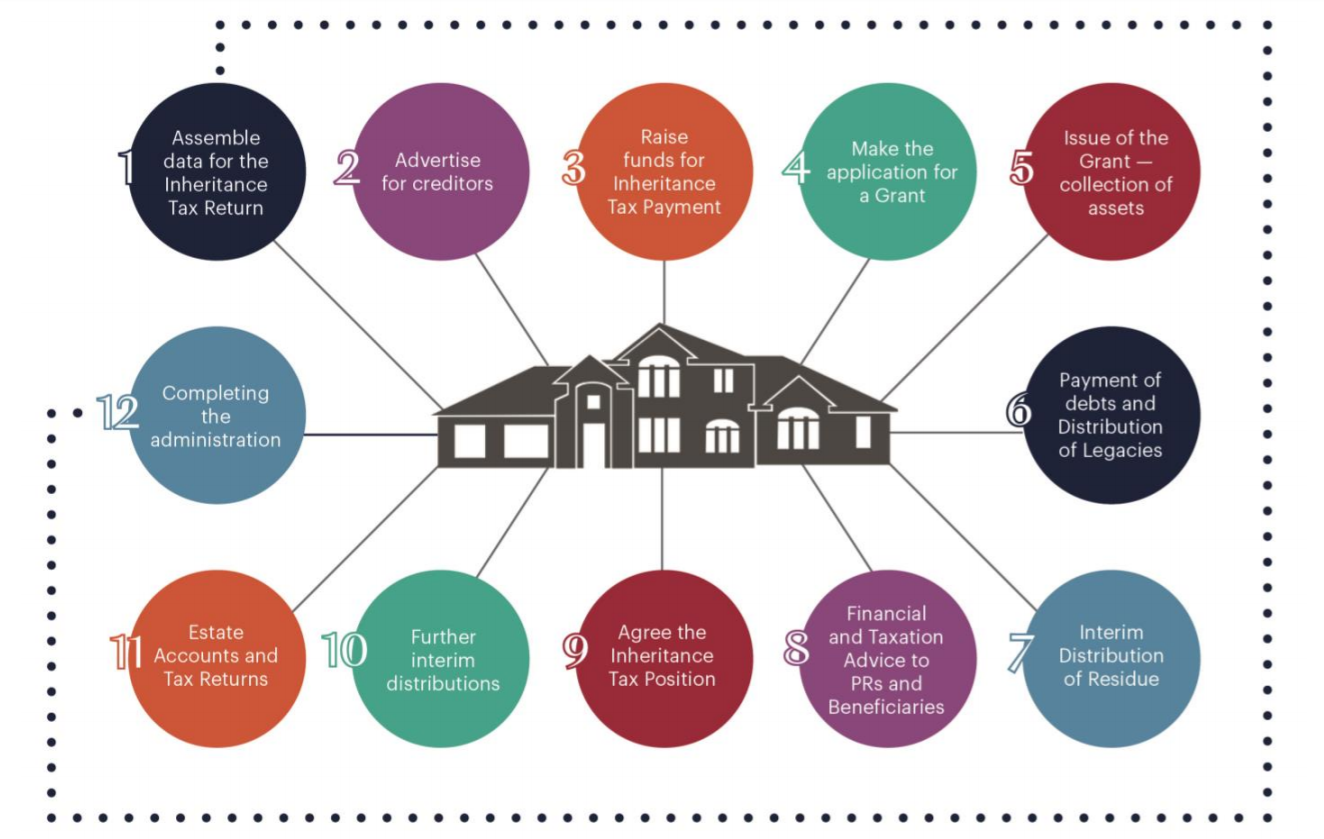Probate: steps in the administration of an estate
Insight

What is involved
The administration of an estate, sometimes referred to as 'probate' is the process whereby the Personal Representatives (PRs) take control of the Deceased's assets to discharge liabilities (including Inheritance Tax) and distribute these assets to the beneficiaries.
If the Deceased has left a Will, the PRs will be the Executors appointed by the Will and they will distribute the estate in accordance with the terms of the Will. The document issued by the court which establishes their right to deal with the estate (the grant of representation) is a Grant of Probate. If there is no Will, the PRs are Administrators and the Court will issue a Grant of Letters of Administration. The distribution of the estate will depend on the statutory intestacy rules.
Throughout the administration, it is the PRs who are responsible to third parties, including creditors, HM Revenue & Customs and the beneficiaries for the proper administration of the estate. The beneficiaries' entitlement is a right to have the estate properly administered: they do not become entitled to the Deceased's assets until ownership is handed over to them by the PRs.

Further information
1. Assemble data for the Inheritance Tax Return
- Write to, among others, banks, building societies, accountants, stockbrokers and life insurance
companies. - Investigate lifetime gifts.
- Organise valuations of property and chattels.
2. Advertise for creditors
- Protects PRs against those creditors they are not yet aware of.
- These advertisements are sometimes described as ‘Trustee Act Notices’.
3. Raise Funds for payment of Inheritance Tax
- Tax on personal property (everything except land and buildings) is payable on applying for the Grant
and tax is due after six months from the end of the month in which death occurs. - Most assets will not be released to the PRs until they get the Grant, but funds may be released by
banks, building societies, NS&I or stockbrokers holding investments in a nominee name for payment
of Inheritance Tax before the Grant is obtained. If not;
o PRs may borrow for this purpose.
o Interest on unpaid Inheritance Tax runs from six months from the end of the month in which
death occurs.
o Penalties apply for non-submission of Inheritance Tax Account after one year.
o Penalties also apply if PRs fail to disclose correct and complete information to HM Revenue &
Customs (including joint assets and lifetime gifts).
o There is now more responsibility on PRs to supply accurate valuations.
4. Making the application for a Grant on your behalf
The application papers comprise the Executors' (or Administrators') Statement of Truth and, in most
cases, the HM Revenue & Customs Inheritance Tax Account. The Statement of Truth is a short document which gives brief details of the Deceased and any Will, sets out the reasons why the Executors (or Administrators) are entitled to apply for the grant and states the value of the estate (both before and after debts, but before tax).
- The Inheritance Tax Account is due after twelve months from the end of the month in which death
occurs. - Inheritance Tax on movable property is payable on making the application.
- The Probate Registry can take between three and four weeks to process applications and issue the
relevant grant (and sometimes longer). - Court fees apply.
5. Issue of the Grant — collection of assets
- Once issued, the Grant is sent to the asset holders (banks, company registrars, etc.) who put the
assets in the PRs' names or close accounts. - All cash is usually collected in our client account.
6. Payment of debts and Distribution of Legacies
- Funeral and administration costs.
- Debts - including any Inheritance Tax loan.
- Specific legacies — e.g. pictures or jewellery.
- Pecuniary legacies — amounts of money left to beneficiaries.
- The PRs may need to sell investments to settle debts and pecuniary legacies.
- Interest payable on unpaid legacies after one year from death.
7. Interim Distribution of Residue
- May be in the form of cash or shares.
- If the main asset is a house, any distributions may have to wait until it has been sold.
- The PRs must keep back a reserve for further Inheritance Tax (tax on real property, i.e. land and
buildings, is due in annual instalments starting approximately six months after the date of death),
any unquantified debts (e.g. pre-death Income and Capital Gains Tax) and on-going administration
expenses, including legal and accountancy fees. - Timescales for distributions depend on the complexity of the estate in question and the terms of the
Will
8. Financial and Taxation Advice to the PRs and Beneficiaries
At appropriate stages in the administration we may:
- Assist the beneficiaries in an overall review of their financial position, taking into account their
inheritance from the estate, and give general financial and tax planning advice. - Consider a Deed of Variation — essentially a deed altering the distribution of the estate to achieve
immediate or future Inheritance Tax savings. - Advise and deal with claims for Heritage Property Exemption — to obtain exemption from
Inheritance Tax for real or personal property of National, Historic or Artistic importance.
9. Agreeing the Inheritance Tax Position
- HM Revenue & Customs examines and makes enquiries on matters reported in the Inheritance Tax
Account. - The PRs may be asked to substantiate claims for agricultural and business property relief.
- The values of real property may be referred to the District Valuer and private company shares are
referred to the Shares Valuation Division. - The PRs may make further payments of Inheritance Tax and submit one or more Corrective Accounts, reporting amendments to the value of assets and liabilities discovered during the administration. The aim is to agree the value of the estate for Inheritance Tax purposes. In complicated estates this process can take several years.
10. Further interim distributions
- As and when funds become available (e.g. upon the sale of property) the PRs may make further distributions to the beneficiaries.
11. Estate Accounts and Tax Returns
- Depending on income and gains received and the value of the estate, PRs may need to submit Income
and Capital Gains Tax returns (or else formally report income) for each year covered by the
administration. - We can prepare Estate Accounts and send interim accounts reporting on the current position in the
administration to the PRs and beneficiaries. - Beneficiaries will be provided with the information relating to their entitlement from the estate which
needs to be reported in their personal returns.
12. Completing the administration
When the Inheritance Tax position has been agreed by HM Revenue & Customs, the PRs will:
- Finalise the Estate Accounts.
- Make any final distribution 'due to the beneficiaries'.
To download a pdf copy, click here.
For further information, please speak to a member of our Private Client Team or to your usual contact at the firm.
This publication is a general summary of the law. It should not replace legal advice tailored to your specific
circumstances.
© Farrer & Co LLP, July 2019







